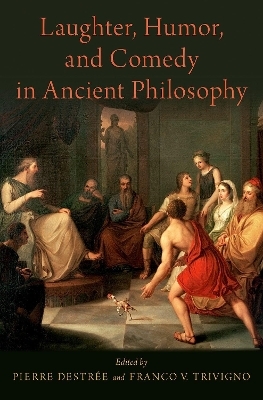
Laughter, Humor, and Comedy in Ancient Philosophy
Seiten
2019
Oxford University Press Inc (Verlag)
978-0-19-046054-9 (ISBN)
Oxford University Press Inc (Verlag)
978-0-19-046054-9 (ISBN)
Ancient philosophers considered question about laughter, humor, and comedy to be both philosophically interesting and important. They theorized about laughter and its causes, moralized about the appropriate uses of humor and what it is appropriate to laugh at, and wrote treaties on comedic composition. They were often merciless in ridiculing their opponents' positions, borrowing comedic devices and techniques from comic poetry and drama to do so.
This volume is organized around three sets of questions that illuminate the philosophical concerns and corresponding range of answers found in ancient philosophy. The first set investigates the psychology of laughter. What is going on in our minds when we laugh? What background conditions must be in place for laughter to occur? Is laughter necessarily hostile or derisive? The second set of questions concerns the ethical and social norms governing laughter and humor. When is it appropriate or inappropriate to laugh? Does laughter have a positive social function? Is there a virtue, or excellence, connected to laugher and humor? The third set of questions concerns the philosophical uses of humor and comedic technique. Do philosophers use humor exclusively in criticizing rivals, or can it play a positive educational role as well? If it can, how does philosophical humor communicate its philosophical content? This volume does not aim to settle these fascinating questions but more importantly to start a conversation about them, and serve as a reference point for discussions of laughter, humor, and comedy in ancient philosophy.
This volume is organized around three sets of questions that illuminate the philosophical concerns and corresponding range of answers found in ancient philosophy. The first set investigates the psychology of laughter. What is going on in our minds when we laugh? What background conditions must be in place for laughter to occur? Is laughter necessarily hostile or derisive? The second set of questions concerns the ethical and social norms governing laughter and humor. When is it appropriate or inappropriate to laugh? Does laughter have a positive social function? Is there a virtue, or excellence, connected to laugher and humor? The third set of questions concerns the philosophical uses of humor and comedic technique. Do philosophers use humor exclusively in criticizing rivals, or can it play a positive educational role as well? If it can, how does philosophical humor communicate its philosophical content? This volume does not aim to settle these fascinating questions but more importantly to start a conversation about them, and serve as a reference point for discussions of laughter, humor, and comedy in ancient philosophy.
Franco V. Trivigno is Professor of Philosophy in the Department of Philosophy, Classics, History of Art and Ideas at the University of Oslo. He is the co-editor (with Nancy Snow) of The Philosophy and Psychology of Character and Happiness (Routledge, 2014). Pierre Destrée is an Associate Research Professor at the FRS (Fonds de la Recherche Scientifique), and teaches ancient philosophy at the University of Louvain (Louvain-la-Neuve). He has edited numerous volumes with Brill, Wiley-Blackwell, Peeters Publishers, and Cambridge University Press.
| Erscheinungsdatum | 23.08.2019 |
|---|---|
| Verlagsort | New York |
| Sprache | englisch |
| Maße | 236 x 163 mm |
| Gewicht | 590 g |
| Themenwelt | Geisteswissenschaften ► Philosophie ► Philosophie Altertum / Antike |
| ISBN-10 | 0-19-046054-7 / 0190460547 |
| ISBN-13 | 978-0-19-046054-9 / 9780190460549 |
| Zustand | Neuware |
| Haben Sie eine Frage zum Produkt? |
Mehr entdecken
aus dem Bereich
aus dem Bereich
mit Sokrates, Seneca, Platon & Co. im Gespräch
Buch | Hardcover (2023)
FinanzBuch Verlag
18,00 €


